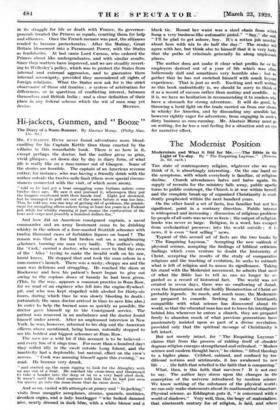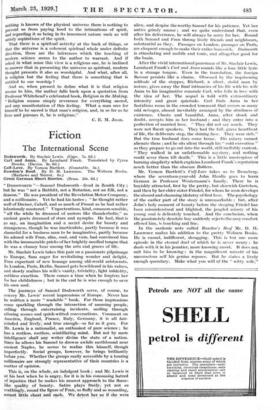The Modernist Position
Tom state of contemporary religion, whatever else we may think of it, is absorbingly interesting. On the one hand are the symptoms, with which everybody is familiar, of religious decline. Church attendances halve and halve again, the supply of recruits for the ministry falls away, public apathy turns to public contempt, the Church is at war within herself, and the complete break-up of organized Christianity is confi• dently prophesied within the next hundred years.
On the other hand a set of facts, less familiar but not less significant, point in a contrary direction. Public interest is widespread and increasing ; discussion of religious problems by people of all sorts was never so keen ; the output of religious books was never so large. Religion, in a word, has escaped from ecclesiastical preserves into the world outside ; it is news, it is even " best selling " news.
Typical of this second set of facts are the two books by " The Enquiring Layman." Accepting the new outlook of physical science, accepting the findings of biblical criticism, findings which even venture to doubt the historicity of Christ, accepting the results of the study of comparative religions and the teaching of evolution, he seeks to estimate what is left of religion and to assess its significance. Taking his stand with the Modernist movement, he admits that most , . of what the Bible has to tell us can no longer be re• garded as a record of historical fact. The world was not crtated in seven days, there was no swallowing of Jonah, even the Incarnation and the bodily Resurrection of Christ are probably legends. So much, and much more, the Modernist' are prepared to concede. Seeking to make Christianity compatible with what science has discovered about th( world, so that the educated man has not to leave his intelligence behind him whenever he enters a church, they are prepared freely to abandon much of what previous generations have passionately insisted upon as part of a divine, revelation, provided only that the spiritual message of Christianity is left intact.
But not merely intact, for " The Enquiring Layman claims that from the process of ridding itself of obsolete dogmas religion emerges strengthened and refreshed. " Modem science and modern thought have," he claims, " lifted theology to a higher plane. Cribbed, cabined, and confined by tra- ditional notions and sentiments, it has awakened to new life . . . the faith that rebelled is the faith that is conquering." What, then, is this faith that survives ? It is not easy to say. The author lays stress upon the changes in the conception of the universe introduced by modern science, We know nothing of the substance of the physical world ; we can only make statements about its mathematical steucture. Physical science, as Eddington puts it, " is concerned with a world of shadows." Very well, then, the bogy of .materialism, that nineteenth century foe of religion, is laid, and where
nothing is known of the physical universe there is nothing to prevent us from paying heed to the intimations of spirit, and regarding it as being in its innermost nature such as will satisfy aspirations of the spirit.
That there is a spiritual" activity at the back of things, or that the universe is a coherent spiritual whole under definite direction, these are the inferences which the teaching of modern science seems to the author to warrant. And if asked. in what sense this view is a religious one he is inclined to answer that in presenting the universe as spiritual, modern thought presents it also as worshipful. And what, after all, is religion but the feeling that there is something that is entitled to our worship ?
And so, when pressed . to define what it is that religion means to him, the author falls back upon a quotation from professor Whitehead's celebrated book, Religion in the Making. " Religion means simply reverence for everything sacred, and any manifestation of this feeling. What a man sees for himself to be sacred is that man's religion, and, in so far as he lives and pursues it, he is religious."
C. E. M. JoAn.

















































 Previous page
Previous page